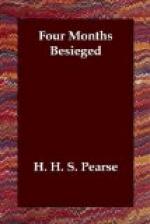November 17.—The 5th Lancers, who, with a company of King’s Royal Rifles, are holding Observation Hill, have hit upon a happy idea for drawing Boer fire by deputy. They keep a man of straw for that purpose with khaki coat and helmet. By showing this now and then, they not only find out exactly where the Boers are, but get occasional chances of putting in a pot shot with effect. The suggestion probably came from Devonshire Hill, where Colonel Knox, who commands all divisional troops on that defensive line, had a dummy battery mounted. This drew fire from Boer guns at once, and gave Colonel Knox a good suggestion as to the sort of earthworks best adapted to resist the artillery fire that could be brought to bear upon them. At three o’clock this afternoon rain began to fall steadily, and mists crept about the hills, putting a stop to further bombardment.
Sunday, November 19.—Just after midnight Boer guns again fired from every position round Ladysmith. What this may mean nobody knows. Perhaps it is a device for keeping Boer sentries on the alert, or there may have been a false alarm causing the enemy’s batteries to boom off a shot each by way of signal, or probably the guns, fired at certain intervals, were sending on a code message to Colenso. Rumours, having their origin in the fertile imaginations of those who think that British troops can achieve wonderful things for our relief, crowd fast upon us. Now we hear of a column marching into Bloemfontein and an hour later men tell gravely of a force under General French having captured Dundee But by some means ill news travels faster even than these absurdly impossible rumours. A Boer doctor has been to Intombi Camp this morning and told the people there that our armoured train was captured yesterday of on Friday near Colensa, and many prisoners taken, including Lord Randolph Churchill’s son. That was the doctor’s way of cheering up our sick and wounded. We might have doubted the story, but circumstances confirm it, and we have so little faith in armoured trains that it seems quite natural for them to fall into the enemy’s hands.
November 20.—Dense white mists rising from the river-bends, and spreading across the plains to hang in a thinner haze about the shady sides of hills, put a stop to bombardment most of the morning. Up to noon there had been practically no shelling, but only an exchange of rifle-shots between Bell’s Spruit by Pepworth and Observation Hill. The enemy, however, made up for lost time later by sending several shells into town and camp. One fell near Captain Vallentin’s house, where Colonel Rhodes and Lord Ava shared the brigade mess; another, passing close to Mr. Fortescue Carter’s house, where several officers of the Intelligence Staff live, shattered the church porch beyond; from Surprise Hill several came into the 18th Hussar camp, where three men were hit, one so badly that his leg had to be amputated; one into the Gordon camp, wounding Lieutenant Maitland




